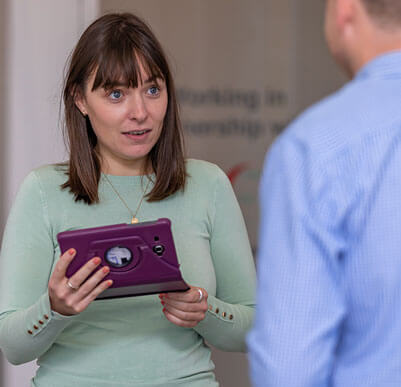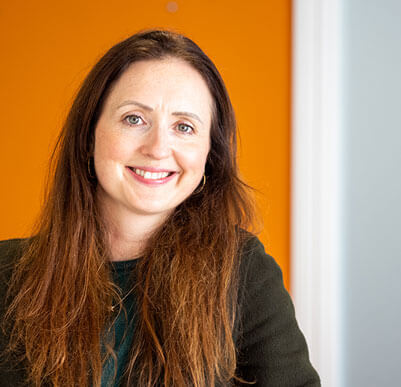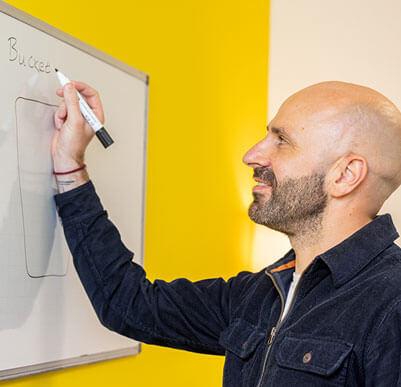Jigsaw Clinician
Jigsaw Clinician
Meet some of our clinicians and find out more about what the role entails. View current posts.
See available positions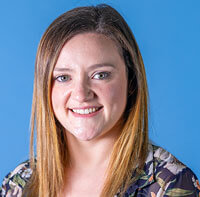
Young people are at the heart of everything Jigsaw does. The team is also really supportive and there are lots of opportunities to learn from each other.
What does a day look like for a Jigsaw Clinician?
As a clinician, my primary role is to meet with young people on a one-to-one basis, assessing their needs and providing therapeutic support through brief intervention.
I see up to four young people most days however, this varies depending on other commitments I may have at any given time. These include completing clinical callbacks or getting involved in Jigsaw community projects, events, and campaigns.
I also represent Jigsaw Donegal at local network meetings including one of the county’s Child and Family Support Networks (CFNS).
My experience before coming to Jigsaw
I am a qualified social worker, having graduated with a Masters Degree from Liverpool John Moores University in 2015.
Before coming to Jigsaw I worked initially as a Children in Care Social Worker with Tusla and then went to Australia where I had a similar role working with Children in Out of Home Care. On my return to Ireland, I then spent time working in Child Protection in the Duty and Area teams before moving to Jigsaw.
Working at Jigsaw
We recently ran webinars for clinicians interested in working at Jigsaw. This is a recording.
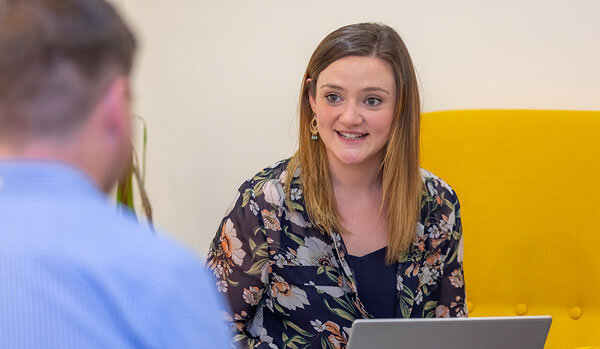
"Young people are at the heart of everything Jigsaw does."
One of the primary advantages of working with Jigsaw is the level of direct work that is undertaken with young people.
What are the benefits of working at Jigsaw?
One of the primary advantages of working with Jigsaw is the level of direct work undertaken with young people. Young people are placed at the heart of everything Jigsaw does.
Also, the team is really supportive and there are lots of opportunities to learn from each other through group supervision, journal clubs, and those all-important chats over cups of tea.
Additionally, there are good CPD opportunities with Jigsaw to pursue areas of interest and develop as a practitioner
>> Read more about the benefits of working at Jigsaw
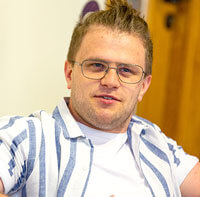
I love working for Jigsaw because I am encouraged to be myself and bring myself into the work I do with young people.
What does a day look like for a Jigsaw Clinician?
A typical day in Jigsaw is very different from other spaces that social workers find themselves in. Social workers typically work in unpredictable and fast-paced environments, running from crisis to crisis, and regularly working beyond the expected hours.
Comparatively speaking, Jigsaw provides a more structured, manageable, and nurturing environment. Set hours, a maximum of four sessions each day, protected time for case notes, and punctuated with regular supervision, training, and CPD opportunities.
What are the benefits of working at Jigsaw?
I love working for Jigsaw because I am encouraged to be myself and bring myself into the work I do with young people. I am given space and encouragement to research and explore new ways of working and can draw from other disciplines within the team.
It is a place where I feel genuinely excited to come into each day for work. Jigsaw places young people at the centre of the work and its values of compassion, collaboration, and integrity align deeply with my own and with those of social work. Each day, I am privileged to meet and get to know unique, talented, and resilient young people, and to play a small part in nurturing their potential.
Jigsaw also provides support to further your professional development by offering an Education and Training Grant and €150 Continous Professional Development support. This is in addition to covering the cost of your professional registration in CORU.
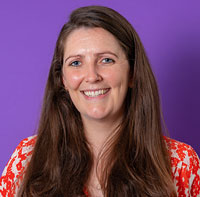
Jigsaw was somewhere I wanted to work, as I viewed it as a progressive and dynamic organisation. Coming back from London and after working in the NHS, that was very important to me.
What does a Jigsaw Clinician do each day?
A typical day in Jigsaw varies. For the most part, it comprises completing four to five sessions as a clinician and working with people age 12-25. The work can be very young person-led or at times can be very focused on risk management and safety.
My experience before coming to Jigsaw
I worked as an occupational therapist in physical health settings for over two years and then for one year in an acute inpatient mental health ward in London.
I always wanted to work in an area seeing the challenges people faced as adults in mental health. I knew I would like to work with people younger to try and prevent some of the difficulties people faced as they grew older.
Jigsaw was somewhere I wanted to work, as I viewed it as a progressive and dynamic organisation. Coming back from London and after working in the NHS, that was very important to me.
What are the advantages of working with Jigsaw?
- Gaining experience in working with 12 – 25-year-olds using evidence-based practice
- Significant levels of knowledge and experience in leadership teams that provide strong learning opportunities for staff
- Continuous Professional Development (CPD)
- A small organisation so you know senior management names and faces
- Ability to feed into decisions as much as practicable
- Competitive salary and annual leave for a charity organisation
- Open to diversity and new learning
- Meets challenges and honest critique with a willingness to consider the concerns and is open to listening.
Vacancies at Jigsaw




